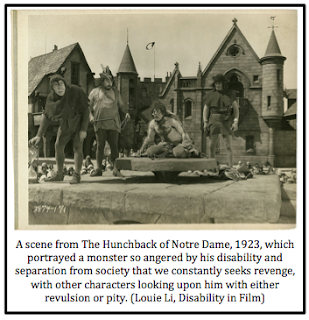While Halloween remains my favorite holiday of the year
because of its ability to inspire young minds to create costumes and get out of
their comfort zones, it is also a holiday that is full of insensitive
portrayals of marginalized groups of people, even among educators, that I think
we need to be careful of.
“Many people think
that people with disabilities have a monopoly on pain. People with disabilities
do not have a monopoly on pain, we just have a pain that nobody cares about.”
-Justin Martin, a writer, poet, and advocate from Hilliard, Ohio
 The portrayal of people with disabilities for entertainment has
a long history of exploitation in American media, such as films around the turn
of the 20th century that employed depictions of people with
disabilities in comedy and horror films. This year, just as in many years past,
I continue to see members of our community use disability as comedic relief in
their Halloween costumes, such as pretending to have a walking abnormality when
portraying a monster or using a walker when portraying an elderly person. The
issue here is that portraying people belonging to an oppressed group as
entertainment is belittling and dehumanizing. As advocate Lydia X. Z. Brown
states on their website, Austistic Hoya, “This process of enfreakment has a long
history that includes the freak show sideshows accompanying circuses that put
people with visible disabilities and deformities on display for public
amusement and pity. When it comes to these types of portrayals, it contributes
to the message that says that these are not people worthy of respect or dignity
for no reason other than their disabilities.” (Austistichoya.com)
The portrayal of people with disabilities for entertainment has
a long history of exploitation in American media, such as films around the turn
of the 20th century that employed depictions of people with
disabilities in comedy and horror films. This year, just as in many years past,
I continue to see members of our community use disability as comedic relief in
their Halloween costumes, such as pretending to have a walking abnormality when
portraying a monster or using a walker when portraying an elderly person. The
issue here is that portraying people belonging to an oppressed group as
entertainment is belittling and dehumanizing. As advocate Lydia X. Z. Brown
states on their website, Austistic Hoya, “This process of enfreakment has a long
history that includes the freak show sideshows accompanying circuses that put
people with visible disabilities and deformities on display for public
amusement and pity. When it comes to these types of portrayals, it contributes
to the message that says that these are not people worthy of respect or dignity
for no reason other than their disabilities.” (Austistichoya.com)
As educators, we must be advocates for ALL of our students. Are
you portraying a disability in a form that subliminally messages to students
that it disability is a pitiful struggle? Would you feel comfortable pretending
to be someone with Down Syndrome for Halloween? If not, then why do we feel
comfortable portraying someone who requires a walker, cane, or wheelchair?
Would you feel comfortable pretending to use a walker in front of a student
whose requires the daily use of a walker? While you may laugh and then walk
away from that walker at the end of the day, that student’s walker is
intertwined with their being and they cannot remove themselves from needing it
whenever they please. Just as we have done with blackface and many other
culturally insensitive forms of entertainment, I believe it is time for us to
reflect on how we portray marginalized groups as entertainment, especially when
we, as educators, are the role models for the future generation.
“So, call it simulation, call it pretending, call it faking,
or call it playing disability. Whatever it is, and no matter if it’s done with
ill will, kindness, or anything in between, it’s not cool to play around in a
wheelchair, the space that is so much a part of my identity and my reality.”
-Emily Ladau, Words I Wheel By
No comments:
Post a Comment